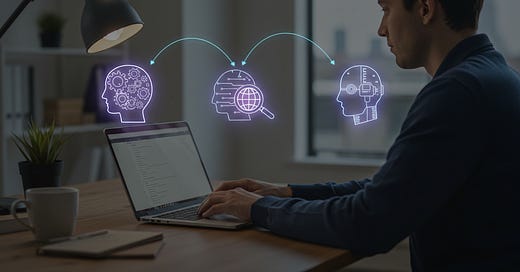The Cognitive Cost of Convenience: How ChatGPT Affects Your Brain When Writing
A closer look at how ChatGPT shapes the way we think, write, and remember—based on groundbreaking EEG data.
Imagine sitting down to write an essay. You have three options: rely entirely on your own knowledge and creativity, use a search engine like Google to gather information, or enlist the help of an AI assistant such as ChatGPT. Which path would you choose? More importantly, what does your choice imply for your cognitive health in the long run?
Researchers from MIT Media Lab, Wellesley College, and MassArt recently investigated this intriguing question. They conducted a detailed experiment in which participants wrote essays under three different conditions: entirely unaided, assisted by a search engine, or supported by the AI-driven ChatGPT. To measure brain activity, they employed advanced EEG technology, closely monitoring cognitive engagement, mental effort, and neural connectivity throughout the essay-writing tasks.
Uncovering the Hidden Impacts
The results of this experiment were insightful and raise important concerns about our increasing reliance on technology.
Participants who relied solely on their mental faculties showed the highest neural connectivity according to EEG data. In other words, their brains were deeply engaged, effectively managing complex tasks such as critical thinking, memory retrieval, problem-solving, and creative idea generation. Writing independently required substantial mental effort, reflecting robust cognitive activity and intellectual involvement.
Conversely, participants who used a search engine displayed moderate levels of neural connectivity. These individuals still engaged actively with information processing, selecting, evaluating, and synthesizing content from external sources. Although their cognitive load was somewhat reduced compared to those writing without any help, their mental activity remained relatively high, sustaining a moderate degree of cognitive rigor.
However, the most significant findings came from participants assisted by ChatGPT. EEG analysis indicated notably lower neural connectivity, suggesting minimal cognitive engagement. Participants relying heavily on ChatGPT showed reduced brain activation and significantly less cognitive effort than those in the other two groups. Interviews conducted after the tasks revealed that these participants often struggled to remember details or accurately quote from their essays. Many described their writing experience as detached and impersonal, frequently admitting to substantial copying and pasting rather than original thinking.
The Challenges of Changing Methods
The researchers explored what happened when participants switched their writing methods during the study. Those who initially used ChatGPT but later attempted writing unaided experienced considerably weaker neural connectivity compared to those who consistently worked without AI support. Their brains appeared adapted to the lower cognitive demands introduced by AI, making subsequent independent tasks notably more challenging.
In contrast, participants who started by writing essays independently and later integrated ChatGPT showed higher neural connectivity even when using AI. These individuals actively combined their existing knowledge with AI-generated insights, maintaining stronger cognitive engagement. This approach was found to be more effective, highlighting the benefit of first establishing a solid cognitive foundation before incorporating technological assistance.
Addressing Cognitive Debt
This research spotlights a critical concern: while AI tools like ChatGPT undoubtedly simplify tasks and accelerate productivity, excessive reliance may lead to a form of cognitive "debt." Overdependence on these tools could weaken essential cognitive skills, including critical thinking, memory retention, and independent idea synthesis.
For educators, policymakers, corporate leaders, and learners, these findings underscore the importance of understanding the hidden cognitive costs associated with AI reliance. While AI can greatly enhance productivity, being aware of its potential long-term impact on cognitive abilities is crucial.
Striking the Right Balance
The authors emphasize the significance of balanced technology integration, advocating intentional and mindful use of AI. They suggest regularly stepping away from AI assistance to actively engage in cognitive tasks independently, which could help maintain and even enhance cognitive functions.
Practically speaking, the next time you're tempted to let ChatGPT fully draft your report, essay, or article, consider initially investing some personal effort. The mental exertion today might preserve and protect your cognitive health tomorrow.
Key Takeaways:
🧠 Writing independently leads to the highest levels of cognitive engagement and mental development.
🔍 Using search engines offers moderate cognitive relief while still demanding active mental integration.
⚠️ Excessive reliance on AI assistants like ChatGPT significantly reduces cognitive engagement and neural activity.
🔄 Transitioning from AI dependency to independent tasks can be challenging due to cognitive adaptation effects.
🛠️ Building a strong foundation of independent cognitive activity before utilizing AI can mitigate some negative impacts.
By understanding these dynamics, we can make informed decisions, strategically balancing AI use to optimize both productivity and long-term cognitive well-being.






